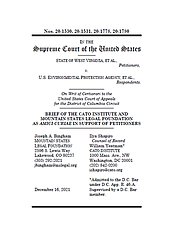Learn more about Cato’s Amicus Briefs Program.
In 2009, the House of Representatives passed a “cap-and-trade” policy to fight global warming, but the bill died on the vine in the Senate. So, President Obama ordered the EPA to do what Congress wouldn’t. As directed, the agency issued a rule—the Clean Power Plan—that involved a nationwide cap-and-trade. The upshot is that the Obama administration imposed the very policy that Congress had declined to adopt after much deliberation.
On its face, the Clean Power Plan defies common sense. How can an agency achieve what Congress failed to do? Yet the rule also flies in the face of the Supreme Court’s “major questions” principle, which forbids regulatory agencies from basing “major” policies on creative interpretations of vague old laws. You’d think Congress would be clear when it confers authority to remake the electricity grid, but the Clean Power Plan was based on an obscure and rarely used “catchall” provision.
Still, in a split 2 – 1 decision last January, the D.C. Circuit found “ample discretion” in the “gaps” of the Clean Air Act to authorize an overhaul of the electricity sector.
Various states and industries petitioned the Supreme Court to review the D.C. Circuit’s decision, arguing that the major questions doctrine demands a reversal. The Court took the case.
Building off our prior work in this controversy, the Cato Institute, joined by the Mountain States Legal Foundation, today filed a brief in support of the petitioners. We urge the Court to build out its major questions doctrine and, to this end, we propose a framework for identifying “major” rules.

This work is licensed under a Creative Commons Attribution-NonCommercial-ShareAlike 4.0 International License.


